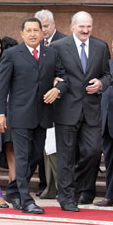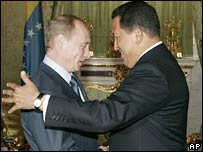What game is Henry Ramos Allup playing?
Two days ago, a group of opposition parties dubbed "Meeting Point" and led by Accion Democratica took
ten demands to CNE, portraying them as minimum conditions to take part in elections. AD's Victor Bolivar, speaking for the group, told
Notitarde "we are not looking for excuses in order not to participate, as some say, we're asking for guarantees. We have always been participationists. We're seeking to defend the right to vote."
So far, so good. But then yesterday, when news came that Jorge Rodriguez had agreed to step aside from CNE - undoing one of the key obstacles to realizing Meeting Point's first and central demand - AD Secretary General Henry Ramos Allup flipped,
telling reporters:"Everyone should understand that
even if they guarantee hand-counting of votes, nothing changes if you have five hustlers upstairs who undermine it, who alter the tally sheets. What good is a manual count with a twisted voter registry? With [Jorge Rodriguez's] exit nothing changes if they don't take concrete steps for people to be convinced that the system is trustworthy, because
people are not going to vote and there will be very low turnout come hell or high water." (llueve, truene o relampaguee.)Hmmmmm. Which one is it? Is AD actually trying to work pragmatically towards proper voting conditions? Or will they keep moving the goal posts, discounting the possibility of a fair vote
a priori, as a matter of dogma? What's the point of sending lists of demands to CNE if you've already decided there will be very high abstention "come hell or high water"? Precisely what kind of twisted game is Ramos Allup playing?
The less reactionary of the oppo party groupings, Primero Justicia-led "Together for Venezuela" (isn't it funny how the more divided they get the more they use words like "meeting" and "together" to call the splinters?!)
called Jorge Rodriguez's decision "an important step."
Hey, I'm not saying the next CNE will necessarily be better than the last (how could I?) I'm just saying it's really bad form to start slinging mud at it pre-emptively, before we even know who'll be on it.
Please comment responsibly:
|
The case against primaries
The opposition rank and file sees it as self-evident that there should be a primary election to choose a single opposition candidate to run against Chavez in December. Frustration that the idea doesn't seem to be gaining ground among potential candidates is just item umpteen in antichavistas' frustration with their purported "leaders." But is a primary really such a good idea?
Lets see. In the US, the country with the longest tradition of using primaries to choose presidential candidates, the trouble with the system is well understood. The Primary Dilemma, to give it a name, is that the positions a candidate has to take to win a primary are often at odds with the positions that win general elections.
The Democratic Party primaries are decided mostly by democrats - who by definition are more liberal than the electorate as a whole. In order to be competitive in the primaries, Democrats come under a lot of pressure to parrot the Democrat party line on a whole series of divisive issues - from affirmative action to teachers' unions to gun control. But those positions are obviously more popular with Democrats than with the electorate as a whole, so a candidate who wins a primary by sticking closely to the party line finds himself in trouble in the fall.
Of course, Republican primary candidates face a symmetric dilemma.
Now, four decades of experience with the system have served a purpose in the US: American party loyalists have learned the hard way that selecting candidates who are too partisan is a losing strategy for the fall. Barry Goldwater's disastrous 1964 campaign cured the GOP's appetite for extreme partisanship in primary candidates, and George McGovern's 1972 and Walter Mondale's 1984 campaign worked in the same way for the Democrats. By now, primary voters are well aware that it's no use choosing somebody who can't win in the fall. In other words, primary voters understand the Primary Dilemma, and so "electability" has become one of the key elements in primary voting decisions (even if, as the Kerry experience shows, primary voters don't always get it right.)
Trouble is, Venezuela doesn't have decades of experience with primaries, and the level of hysterical polarization is even higher than in hysterically polarized D.C. In those conditions, the Primary Dilemma would be especially damaging: oppo pre-candidates would come under extreme pressure to adopt a radical anti-Chavez posture. Certainly, only the hardest of the opposition hard-core could be expected to turn out to a criollo primary, so it's easy to imagine how any sign of moderation would immediately undermine an oppo pre-candidate's chances.
The likelihood, then, is that a primary would weed out the candidates with the best chance to beat Chavez, and work in favor of the kind of comecandela radicalism that polling shows can't possibly rally a majority against Chavez.
In fact, as a brand, "The Opposition" is so tarnished today that winning an "opposition primary" would be an albatross around the winner's neck. Tagged as "the" opposition candidate, it would be extraordinarily difficult for any politician to credibly woo wavering chavistas - which is absolutely necessary if we're going to have a prayer in December.
So far, the candidate who has run the smartest (though not the most successful) pre-campaign has built it around shunning the "opposition" label altogether and explicitly reaching out to chavistas. Some twist on that strategy is inevitable if we want to have a chance in December. But would someone who regularly gets in front of crowds and says "both are right, not one step backward AND they shall not return!" (¡Ni un paso atras Y no volverán!) have any chance at all in an oppo primary? I really don't think so.
The alternative? Simple: the implicit primary. Let all of them run. In time, one of them will take a lead in the polls. Antichavez voters will eventually see which way the wind is blowing and line up behind the front-runner. You don't have to pre-plan polarization in an atmosphere like Venezuela's: if there's one thing we've learned over the last seven years is that it happens all by itself.
Please comment responsibly:
|
Once again, for the non-economists
Quico has asked me to clarify the logic through which indirect subsidies work as gifts.
Suppose you own an apartment that is worth 200 thousand dollars. Suppose you sell this apartment to your newlywed son and his wife for 150 thousand. Suppose they go out and sell this apartment and make a quick 50 thousand dollars. If instead of selling the apartment to your son you had sold it on your own for 200 grand and given 50 grand to your son, you would have both been left with the same amounts: your $150K and your son's $50K. Under-selling is therefore a gift, a gift worth the price of the difference.
Now, substitue "you" for PDVSA, and substitute "the apartment" for "a lot of gasoline." Finally, substitue "your son" for "the rich." I'm sure you get the picture.
You can play this game substituting "PDVSA" for "CADIVI" and "gasoline" for "dollars."
Now, the key to quantifying this subsidy is knowing what the market price of the good is. In the case of gasoline in Venezuela, it's almost impossible to tell since the price is controlled and has been forever. However, a
brilliant friend of mine figured out that there was one instance where the real price of gasoline revealed itself: in the paro petrolero, the black market price for gas was in effect the "real" price of gasoline, since getting gas from other sources implied looooong lines and was, in some days, close to impossible. If I recall correctly, the price was five or six times the regulated price. I thought that was a nifty idea.
Please comment responsibly:
|
Margot & Maria Luisa
“.....Particularmente es un síndrome que es endémico en nuestro manicomio: la histeria. Estudiando lo escrito sobre esta enfermedad -que solemos achacarle, injustamente, sólo a lo femenino-, he encontrado que la histeria viene a ser la antítesis de la historia, por consistir en una condición que bloquea la posibilidad de entender el sentido y las lecciones de nuestros fracasos y limitaciones. Dice un historiador que la histeria es como una plataforma donde rebota todo lo que nos acontece, impidiendo que lo vivido pueda transformarse en experiencia. Esto hace que nos quedemos continuamente en la superficie, sin llegar jamás a profundizar, sin llegar a tener una visión interior, sin unir nuestro pasado a la historia del hombre sobre La Tierra. Tenemos pues que Venezuela es un país histérico sometido a una repetición infernal. Nuestra mayor pobreza es carecer de una verdadera historia de nuestro empobrecimiento...” Federico Vegas, “Falke”
Maria Luisa
Maria Luisa lives in a comfortable house in Prados del Este. A staunch anti-chavista, she prides herself for having gone to dozens of marches. She figures in the Lista Tascón as, in her words, a “hopeless squalid one.”
Maria Luisa works for a law firm that has seen better days. In spite of her diminishing productivity, she is proud of being a self-made woman. She is the single mother of Claudia, a student at the UCV School of Dentistry. She hopes her daughter goes to the U.S. to earn a Masters degree after graduating, and wishes she stayed in the U.S. to start a new life there because, she claims, “there is no future in this country.”
She enjoys travelling to Florida with her daughter once every couple of years, to “decompress from this country run by chavistas.” She is more than happy to use the profits from the sale of her Cadivi dollars to help pay for her trip.
Maria Luisa says she lives in a “ghetto,” which is her way of calling the area between Plaza Venezuela and Petare where all the “oligarchs” live. And she adds, “I only include Plaza Venezuela because my daughter has to go there and study every day.” She drives a three-year old Ford Explorer, which she bought after she had to give her daughter her seven-year old Toyota Corolla so she could get to class.
When asked about the Misiones, Maria Luisa dismisses them as “Chavez’s vote-buying schemes.” Maria Luisa agrees that some people are probably made better off by the Misiones, but in general she opposes them because, so she claims, for every bolívar that makes its way to the poor, three make its way to the pockets of some corrupt general. She tells me about her former neighbour, a general, who left Prados del Este after buying a house in Cerro Verde for his family, demolishing it and building a brand new one in its place.
Maria Luisa seems proud to say that, because she figures in Lista Tascón, she does not benefit from “this government run by Cubans.” She earns her own paycheck and makes do. She claims she does not indulge, but she is proud of all she has earned, and she does not owe the government or anyone else a single “locha.”
Margot
Margot lives very close to Maria Luisa as the crow flies, in a brick house in Barrio Las Minas. Margot and her 19-year old daughter, Nayareth, wake up at 5 AM every day to catch a jeep that will bring them to the entrance of the barrio. From there, she takes a bus to Chacaíto where Margot works as a short-order cook at a small “cafetería.” Nayareth shares a street-stall in Sabana Grande with three friends, where they sell ladies’ undergarments imported from Colombia. Margot feels lucky to be working relatively close to Nayareth, and she gets to share the two-hour bus rides each way, every day, with her.
Margot and Nayareth are devoted followers of Pres. Chávez. Thanks to the President’s social programs, Margot has enrolled in Misión Ribas, where she is working toward getting her high-school diploma. She and Nayareth were able to get their ID cards for the first time thanks to Misión Identidad, and this allowed them to vote for Chávez in the Recall Referendum “and in every election since.”
Margot and Nayareth have been eating well lately, thanks to the opening of Mercal in their barrio. They were not able to afford meat before, but now they enjoy a steak once in a while. Although she hopes someday Mercal will sell products with uniform quality, “like those you find in the supermarkets of the rich,” she claims the meat and the produce in Mercal are “excellent.” Just last week, she had asparagus for the first time in her life.
Margot suffers from occasional back spasms, a side effect of being on her feet all day, so she visits Barrio Adentro frequently for treatment. Nayareth also goes once a month for pain medication for a bad hip.
Nayareth has a high-school degree, but she would like to continue her studies. She says she has looked at Misión Sucre, but feels she is not ready to leave her job for a career that will probably have uncertain job prospects.
Margot and Nayareth believe what their President tells them. “The oligarchs want to take away the Misiones,” she says, and she is willing to do anything to protect “mi Comandante.” She clearly feels empowered for the first time in her life, and she claims Chávez has done more for the poor than anybody ever has, “or ever will.”
Breaking down their gifts
Margot earns 200 thousand bolívars a month at the "cafetería." Nayareth’s income averages about 200 thousand bolívars per month. Margot also earns 200 thousand bolívars per year as a Christmas bonus. Margot also receives a “Misión Ribas” scholarship of 160 thousand bolívars a month. Their total income for the year amounts to 6.92 million bolívars, or roughly US$2,768 at the market rate of 2500 Bs/US$.
Margot and Nayareth pay 100 thousand bolívars per month as rent. They spend the remainder at Mercal. From a cursory comparison of the prices at Mercal relative to the prices at Excelsior Gama, an upscale supermarket, one could assume that the market prices of goods are about 133% higher than prices at Mercal.
Margot’s total spending at Mercal each year amounts to 5.72 million bolívars. The market value of the goods she buys is roughly 13 million, 50% of which is probably attributable to import costs. Since imports are subsidized through Cadivi, the "international" market value of Margot’s shopping is 14 million bolívars. The implicit Mercal subsidy Margot and Nayareth receive is 8.28 million bolívars a year.
Last year, Nayareth went to Barrio Adentro 12 times. Margot goes to Barrio Adentro about 28 times per year, or 2-3 times a month. One could assume that the market price of each trip to Barrio Adentro is about 40.000 bolívars per visit, including medication and treatment. The value of the Barrio Adentro subsidy for Margot and Nayareth would then amount to 1.6 million bolívars per year.
Finally, one would have to include the cash value of Margot’s Misión Ribas scholarship. This amounts to 1.92 million bolívars.
The total implicit and explicit subsidies Margot and Nayareth enjoy amount to 11.8 million bolívars, or roughly US$4,720.
Maria Luisa and Claudia enjoy a subsidy from the government stemming from the lower price of gasoline. We can assume a market price equivalent to U.S. market prices, which is 18 times the price in Venezuela. I assume that Claudia and Maria Luisa currently spend about 30.000 Bs. per month on gasoline. This implies the total subsidy they receive from the government’s cheap gasoline is 6.12 million bolívars per year.
Claudia studies at UCV for free. If she were to go to law school at UCAB, she would have to pay 3 million bolívars per year. Dentistry is a more expensive degree than law, but only public universities are allowed to offer health-care degrees in Venezuela. We conservatively use the UCAB estimate as the market price for Claudia’s studies.
Maria Luisa earns 3 million bolívars per month. She also gets a Christmas bonus of 5 million bolívars. Her yearly earnings are therefore 41 million bolívars. She spends 85% of her salary on different goods and services, which carry an imported component. I assume that 50% of Maria Luisa’s consumption is imported at the official rate of Bs. 2150 per US$. Therefore, when Maria Luisa and Claudia consume in Venezuela, they are indirectly paying less for goods and services than they would be if imports were allowed in at the market rate. The total amount of this implicit subsidy is 2.836 million bolívars.
Maria Luisa and Claudia each are allowed US$4,000 at the official rate for spending abroad. They are also each allowed US$2,500 at the official rate for Internet purchases, and a separate US$400 for ATM withdrawals abroad. If they were to buy these amounts at the market rate, they would have to pay 34.5 million bolívars. Instead, thanks to Cadivi, they only have to pay 29.67 million. The implicit Cadivi subsidy is therefore 4.83 million bolívars.
The value of total subsidies enjoyed by Maria Luisa and Claudia are therefore 16.786 million bolívars, or roughly US$6,714.
Maria Luisa can’t wait to see the end of the revolution that she claims is destroying her country. In a few years, both Maria Luisa and Claudia will move to the U.S., where Claudia will use the education she has received for free from the Venezuelan government to join an established dental practice in Bethesda. None of Maria Luisa’s descendants will ever live in Venezuela again.
Margot and Nayareth will stay in Venezuela, as will their many descendants. It is unlikely any of them will get to live in Prados del Este.
Each year, the Chávez government increases its net public debt by roughly US$3 billion. Future generations of Venezuelans, which includes Margot’s descendants but not Maria Luisa’s, will have to carry this burden on their shoulders.
Margot and Maria Luisa will never meet.
Please comment responsibly:
|

 Chavez Reelection Blog: Katy documents the government's use of public resources for Chavez's partisan advantage.
Chavez Reelection Blog: Katy documents the government's use of public resources for Chavez's partisan advantage.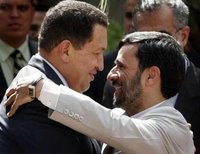

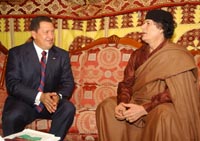

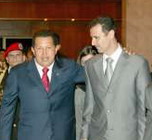
 Site feed
Site feed 